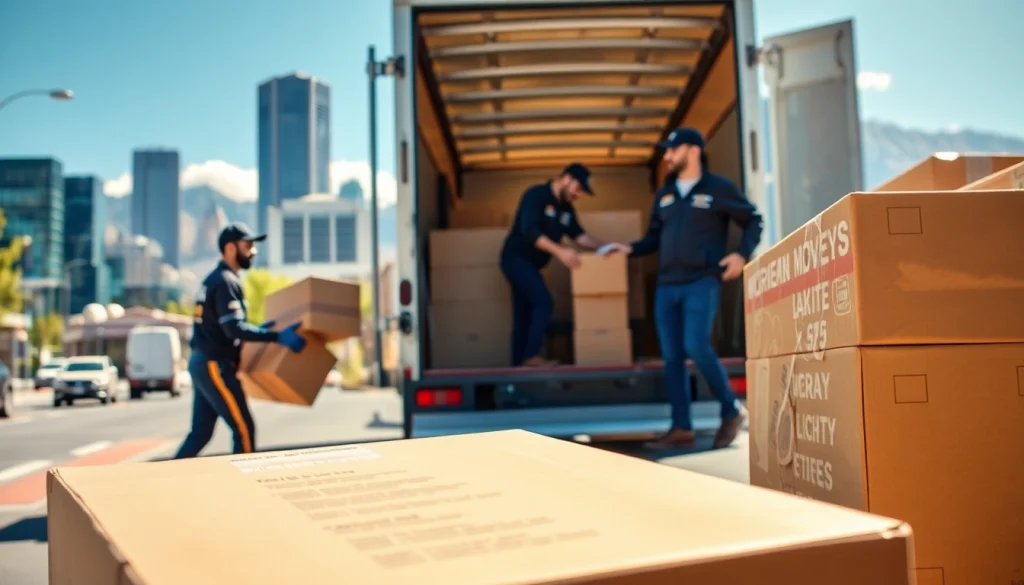Reliable Moving Services for a Seamless Transition at https://bennettsmoving.com/

Understanding Moving Services
Relocating to a new home or office can be both exciting and overwhelming. Choosing the right moving service is vital to ensure a smooth transition. Professional movers provide various options that are tailored to meet unique needs, whether it’s a residential or commercial relocation. For expert moving services, you can explore https://bennettsmoving.com/, which offers comprehensive solutions designed for an efficient move.
Types of Moving Services Offered
Moving services come in several types, each designed to cater to specific needs. Below are some of the major categories:
- Residential Moving: This service is for families or individuals moving from one home to another. It includes packing, loading, transporting, unloading, and unpacking the items.
- Commercial Moving: Tailored for businesses relocating their offices or equipment, these services often involve complex logistics to minimize downtime.
- Long-Distance Moving: For moves that exceed state lines, specialized trucks and plans are necessary to ensure safe transport over longer distances.
- Packing Services: Often an optional add-on, this service will pack your belongings with care, ensuring they arrive safely at your new location.
- Storage Solutions: Many moving companies provide storage options for items that can’t yet be moved into the new space, allowing for flexible transition plans.
Benefits of Hiring Professionals
There are numerous benefits to hiring professional movers:
- Efficiency: Experienced movers understand the best practices for packing and relocating, which can save significant time compared to doing it yourself.
- Savings on Potential Damages: Professional movers are trained to handle your belongings carefully, which reduces the risk of damage during transit.
- Insurance Options: Most moving services offer insurance coverage for your belongings, providing added peace of mind during your relocation.
- Stress Reduction: Generally, a professional moving company assumes most of the stress associated with moving, allowing you to focus on other important aspects of your transition.
How to Choose the Right Moving Service
Selecting the right moving service requires careful consideration. Here are important factors to assess:
- Reputation: Look for reviews and ratings from past customers to gauge the reliability and quality of service.
- Services Offered: Ensure the company provides all the services you need, from packing to unloading.
- Cost Estimates: Obtain detailed estimates from multiple companies. Be wary of unusually low quotes, as they may come with hidden fees.
- Availability: Check the company’s availability on your intended moving date, as popular companies can book up quickly, especially during peak seasons.
- Customer Service: Good communication and customer service can greatly enhance your moving experience.
Planning Your Move
Effective planning is fundamental to a successful move. Proper organization helps streamline the entire process and reduces the potential for last-minute complications.
Categorizing Your Possessions
Begin by categorizing your belongings. Sorting items into the following categories can simplify packing:
- Keep: Items you use regularly and want to bring to your new space.
- Donate: Consider giving away items that you no longer need but are still in good condition.
- Sell: You can host a garage sale or sell items online. This not only declutters but can also provide some extra funds for your move.
- Discard: Disposing of broken or damaged items is necessary and also reduces the weight and volume of your move.
Creating a Moving Checklist
A comprehensive moving checklist is crucial. Here’s how to create one:
- Timeline: Outline when each task needs to be accomplished, from getting quotes to packing up the last box.
- Resources: Note who will help with your move, including friends, family, or hired professionals.
- Supplies: List packing supplies you’ll need, such as boxes, packing tape, markers, and bubble wrap.
- Important Documents: Keep track of essential documents such as contracts, insurance papers, and moving estimates.
Establishing a Moving Timeline
Creating a timeline gives you a structured approach to your move. A sample timeline might look like this:
- 8 Weeks Before: Begin sorting items and organizing a garage sale.
- 6 Weeks Before: Research moving companies and schedule estimates.
- 4 Weeks Before: Confirm your moving date with the chosen mover and finalize packing supplies.
- 2 Weeks Before: Begin packing non-essential items and notify your utility companies of your move.
- 1 Week Before: Finish packing and prepare an essentials box for your first night in the new home.
Preparing for Moving Day
The day of the move is crucial and requires thorough preparation to minimize stress. Being organized can facilitate a smoother transition.
Effective Packing Techniques
Using effective packing techniques can greatly enhance the safety and organization of your belongings:
- Room-by-Room Packing: Pack items room by room and label each box with the content and the room it belongs to.
- Weight Distribution: Ensure that boxes are packed with a good weight distribution, placing heavier items on the bottom and lighter ones on top.
- Use Quality Materials: Invest in sturdy boxes and packing materials, such as bubble wrap, to ensure the safety of fragile items.
Labeling and Organizing Boxes
Labeling boxes effectively can save time during the unpacking process. Here are tips for organizing:
- Color Coding: Use colored labels to distinguish between rooms or types of items.
- Detaile Labels: Include a brief description of the contents on each box for easy identification.
- Essentials Box: Create a box of essential items that you will need immediately upon arrival. Mark it clearly to ensure easy access.
Hiring Additional Help
While professional movers can handle most tasks, consider whether you need extra assistance. This can include:
- Friends and Family: Engage your social circle for help on moving day as an extra set of hands can dramatically reduce the workload.
- Specialist Services: If you have heavy or bulky items, hiring specialists can ensure safe handling and transportation.
What to Expect on Moving Day
On moving day, having a clear plan is essential for efficiency. Understanding the process will help set expectations and prevent surprises.
Communicating with Your Moving Team
Clear communication with your moving team is crucial. Make sure to:
- Provide Clear Instructions: Before the movers arrive, go through your property, discussing what items must be moved and any special handling requirements.
- Stay Available: Be accessible for any questions or concerns that the movers may have during the process.
- Check-off List: Maintain a checklist to ensure that all intended items are loaded onto the moving truck.
Managing Logistics During the Move
Managing logistics involves keeping track of every detail during the move:
- Time Management: Keep an eye on timing to ensure everything is on schedule.
- Traffic Considerations: Be aware of traffic patterns on moving day, which can affect your timeline.
- Final Walkthrough: Perform a last-minute walkthrough of your old home to ensure you didn’t leave anything behind.
Settling in: The First Steps in Your New Home
Once you reach your new place, the first step is settling in. Here’s how to establish a comfortable transition:
- Prioritize Unpacking: Focus on essential rooms like the kitchen and bedroom first to make the space livable.
- Set Up Utilities: Ensure that all utilities and services are set up to avoid inconvenience. This includes gas, water, electricity, and internet.
- Explore Your New Neighborhood: Take some time to explore your new surroundings, get familiar with local amenities, and meet your neighbors.
Post-Move Considerations
After the move, several factors will help you adjust and make the most out of your new environment.
Unpacking and Organizing Your New Space
As you unpack, it’s important to maintain organization:
- Unpack Strategically: Start with the most critical areas and work your way around, unpacking items as needed.
- Keep It Organized: Put things away in an organized fashion to help create a functional living space.
- Recycle Materials: Once you unpack, consider recycling used packing materials to minimize waste.
Adjusting to a New Environment
Adapting to your new surroundings can take time. Here are methods to ease the transition:
- Engage with the Community: Attend local events or join groups to meet new people and learn about the area.
- Stay Connected: Keep in touch with old friends while making space for new relationships.
- Personal Touches: Decorate your home to reflect your personal style, making it feel more like your own.
Evaluating Your Moving Experience
Once settled, reflect on your moving experience. Consider the following to improve future moves:
- Feedback for Movers: Providing feedback can help the moving company improve their services.
- Assess Your Preparation: Evaluate how well you planned and what could be improved for next time.
- Document Lessons Learned: Take notes on what went smoothly and what caused issues to enhance your planning for future moves.







